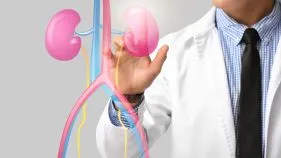Treatment of Cystic Kidney Disease
Cystic Kidney Disease (CKD) refers to a group of disorders where fluid-filled sacs, or cysts, develop in or around the kidneys. These cysts can interfere with the kidneys’ ability to filter blood, potentially leading to kidney failure. CKD may result from genetic mutations, congenital factors, or conditions that develop later in life. Early diagnosis and appropriate treatment are essential to managing the condition and preventing complications.
Types of Cystic Kidney Diseases and Their Causes
- Genetic Forms:
- Polycystic Kidney Disease (PKD):
- Autosomal Dominant PKD (ADPKD): Most common in adults, usually diagnosed between 30 and 50 years old.
- Autosomal Recessive PKD (ARPKD): Rare, affecting kidney development in the womb or shortly after birth.
- Glomerulocystic Kidney Disease (GCKD): A rare condition affecting the glomeruli, causing cysts near the urinary tract.
- Medullary Cystic Kidney Disease (MCKD): Involves cysts in the inner kidney and leads to scarring of filtering tubes.
- Nephronophthisis: Affects children and teenagers, often causing kidney failure before adulthood.
- Non-Genetic Forms:
Cysts that develop due to aging, infections, or as a secondary result of other kidney diseases.
Symptoms of Cystic Kidney Disease
Symptoms vary depending on the type and stage of the disease but may include:
- High blood pressure (hypertension).
- Pain in the back, sides, or abdomen.
- Blood in the urine (hematuria).
- Frequent urinary tract infections (UTIs).
- Decreased kidney function leading to fatigue, nausea, and swelling (edema).
- Enlarged kidneys or abdomen.
Diagnosis
Diagnosing CKD involves a combination of medical history, genetic testing, and imaging techniques:
- Ultrasound: Identifies the presence of kidney cysts.
- CT or MRI Scans: Provides detailed imaging to determine cyst size and impact on kidney function.
- Genetic Testing: Confirms hereditary forms like PKD.
- Blood and Urine Tests: Evaluate kidney function and detect protein or blood in the urine.
Treatment Options for Cystic Kidney Disease
While there is no cure for genetic CKD, treatment focuses on managing symptoms, slowing disease progression, and preventing complications.
1. Medical Management
- Blood Pressure Control:
- Use of ACE inhibitors or ARBs to manage hypertension and protect kidney function.
- Pain Management:
- Over-the-counter pain relievers (avoiding NSAIDs unless directed).
- Prescription medications for severe pain.
- Infection Control:
- Antibiotics for recurring UTIs.
- Electrolyte Balance:
- Monitoring and correcting imbalances, such as elevated potassium levels.
2. Lifestyle Modifications
- Dietary Adjustments:
- Low-sodium, balanced protein intake, and hydration to reduce strain on kidneys.
- Regular Exercise:
- Maintains overall health and supports blood pressure control.
3. Specialized Treatments
- Tolvaptan:
- A medication used to slow cyst growth in ADPKD.
- Dialysis:
- Required for end-stage kidney failure when kidneys can no longer filter blood effectively.
- Kidney Transplant:
- The definitive treatment for irreversible kidney failure.
4. Surgical Interventions
- Cyst Aspiration:
- Draining large cysts to relieve pain or pressure.
- Nephrectomy:
- Removal of severely damaged kidneys in advanced cases.
5. Genetic Counseling
- Recommended for families with a history of PKD or other genetic CKDs to assess risks and plan for future management.
Prevention and Monitoring
While genetic CKDs cannot be prevented, non-genetic cystic conditions can often be managed through:
- Regular Health Check-Ups: Early detection of kidney-related issues.
- Healthy Lifestyle Choices: Diet, exercise, and avoiding smoking or excessive alcohol.
- Monitoring Kidney Function: Regular blood and urine tests to track disease progression.
Conclusion
Cystic kidney disease is a complex condition requiring a multidisciplinary approach to management. At every stage, early diagnosis and individualized care plans can significantly enhance quality of life and slow disease progression. For those living with CKD, maintaining open communication with a nephrologist is essential for tailored treatment and proactive monitoring of complications.




